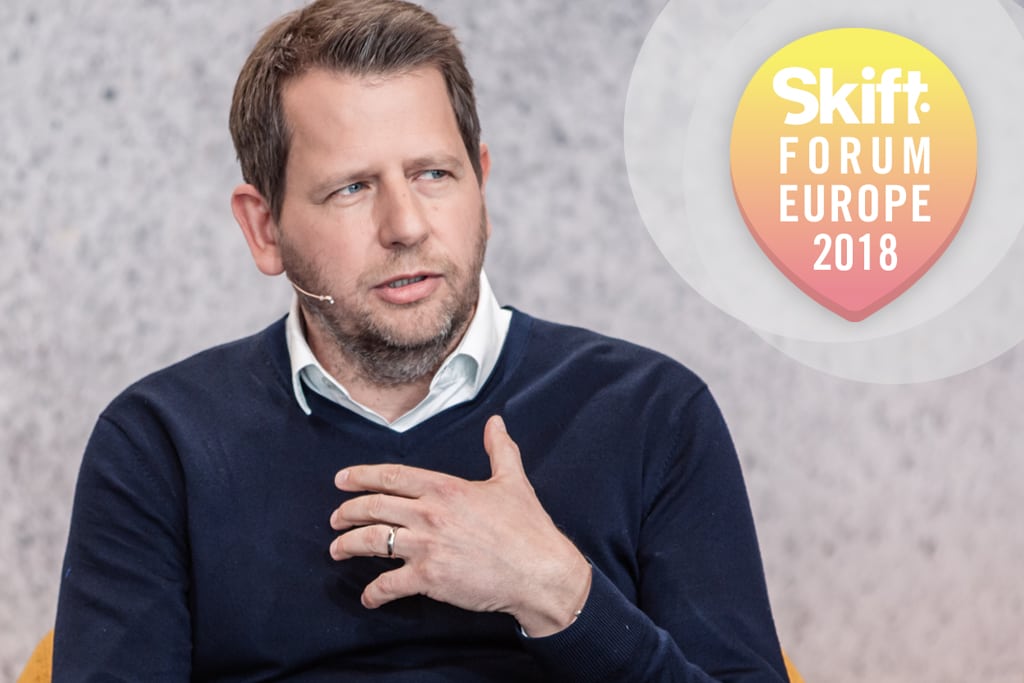Skift Take
Travel hasn't invested in marketing and sales solutions like bots on Facebook in the same way that other global industries have. A spirit of experimentation is necessary, particularly since online advertising is usually a costly endeavor for travel companies.
Facebook has yet to make a focused push into travel booking, focusing on advertising and messaging instead in a strategy more closely aligned with Google’s role as a marketing partner for travel companies.
Henner Blömer, director of automotive, financial services, telecommunications, and travel in Facebook’s DACH region, said at Skift Forum Europe in April in Berlin that mobile is clearly the channel of the future for travel marketers and that going where potential customers spend their time can be a powerful advantage.
“The process of researching, booking, or rating something is online; it’s mobile, I can access it anywhere at any time,” said Blömer. “It’s natural that mobile is the platform of the future and I think travel has to go even more mobile with new services and opportunities to connect with customers where they are and when they want to connect… we really have to be there where the people are.”
Facebook now facilitates two billion messages a month between users and businesses, according to Blömer, and with more than 500 travel-related bots currently active on the platform. While other industries may have taken the lead in innovation on the messaging channel, there are plenty of opportunities to use bots and messaging to create increased engagement with potential customers.
“You have the possibility of messenger services to take functionality from your website and convert it to a more conversational way,” said Blömer. “You really have to rethink how you think about travel. In other industries like automotive, they use the functionality of a car configurator online and build it into a bot on messenger so you can configure a car with a messenger bot. This is really the way to go and to also apply some trial and error thinking in marketing and sales…. really think about where you can integrate technology in your value chain and get your own understanding of where to go and how to develop.”
Blömer said Air France has been perhaps the most successful travel company so far when using Facebook’s platform to reach customers who were considering booking direct and chose not to. By using dynamic ads to show the right Facebook users destination content, they were able to convert bookings that would have likely been lost otherwise.
“If you are able to connect to customers across platforms, it will help you understand [them] because there are signals you can use and read with your marketing to create a connection with a customer,” said Blömer. “Air France targeted customers [who had been] on their website… and they retargeted these clients [who didn’t finish a] booking by building on what destination and what timeframe people were looking for. They tailored content about destinations into dynamic ads. They saw really great success; they covered their costs by 50 percent.”
You can watch the entire interview above, or consider reading more coverage of Skift Forum Europe.
At Skift Forum Europe in Berlin, Europe’s travel leaders gathered for a day of inspiration, information, and conversation.
For more details on the upcoming Skift Restaurants Forum and Skift Global Forum in New York City, as well as the recent inaugural Skift Tech Forum, please visit our Forum site for details.
The Daily Newsletter
Our daily coverage of the global travel industry. Written by editors and analysts from across Skift’s brands.
Have a confidential tip for Skift? Get in touch
Tags: facebook, sfe2018, skift forum europe
Photo credit: Henner Blömer, director of automotive, financial services, telecommunications, and travel in Facebook's DACH region, speaks at the Skift Tech Forum. Skift
